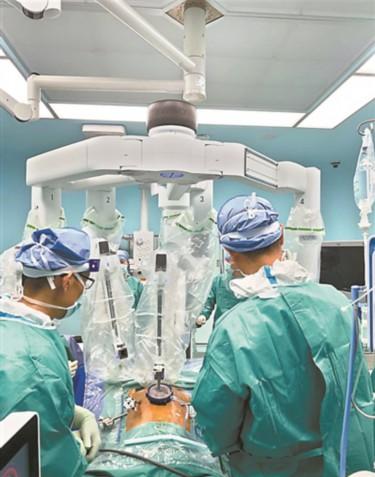
The Da Vinci robot is an advanced laparoscopic system.
Guangzhou Daily News (All-media reporter Xuanhui correspondent Shenzhen Third Hospital photo report) On November 13, the country's first da Vinci robot for AIDS patients to do kidney transplant surgery in Shenzhen Third People's Hospital (the Second Affiliated Hospital of Southern University of Science and Technology) was successfully completed, 32-year-old AIDS patient Mr. Chen (pseudonym) after 11 years of kidney disease, 2 years of dialysis life, successfully changed his kidney and obtained a new life.
Mr. Chen, 32, a native of Anhui, was diagnosed with IgA kidney disease 11 years ago. This nephropathy is the most common primary glomerular disease, the current cause is unknown, clinical manifestations of recurrent gross hematuria or microscopic hematuria, can be accompanied by different degrees of proteinuria, some patients will have severe hypertension or renal insufficiency.
In 2016, Mr. Chen was found to have AIDS and needed to take medication regularly for a long time. After 3 years, Mr. Chen's kidney disease worsened and he had to start dialysis 3 times a week, and his work life was seriously affected.
In September this year, Mr. Chen learned through media reports that the Kidney Transplant Department of the Third Hospital of Shenzhen Could Perform Kidney Transplant Surgery for AIDS Patients, so he went to consult. At the end of October, Mr. Chen was admitted to the hospital, and it was his 55-year-old father, Lao Chen, who was planning to donate a kidney for him. After the successful matching and the completion of the relevant procedures, Lao Chen was found to have diabetes in a detailed physical examination, which is a contraindication to kidney transplantation. Although Lao Chen repeatedly insisted on donating a kidney for his son, considering his health, Yuan Xiaopeng, director of the kidney transplant department, refused Lao Chen's request. Fortunately, in November, Mr. Chen waited for a kidney source that was very suitable for matching.
It is reported that in the past, AIDS patients were once the "forbidden area" of kidney transplant surgery, and the Shenzhen Third Hospital completed the first kidney transplant surgery for AIDS patients in the province in August this year.
According to Yuan Xiaopeng, "In the past, the medical community generally believed that anti-rejection drugs after kidney transplantation would make the patient's HIV infection uncontrollable, so they would not go to kidney transplant surgery for AIDS patients. But with the advancement of HIV drug treatment, it has slowly been discovered that even with the use of anti-rejection drugs, HIV infection can still be well controlled. ”
Speaking of Mr. Chen's surgery, it is impossible not to mention the invited "big coffee" - Da Vinci robot. This advanced laparoscopic system has multiple robotic arms that doctors can remotely control to perform operations that are difficult for their hands to complete. Moreover, the surgical use of da Vinci robots in patients with infectious diseases can effectively reduce the risk of occupational exposure of healthcare workers.
It is reported that Mr. Chen's surgery is the first da Vinci robot kidney transplant surgery for AIDS patients in China.
After Mr. Chen's surgery is completed, the kidney transplant team will work closely with the Department of Infectious Diseases and the Department of Pharmacy to monitor the use of postoperative anti-rejection drugs and the monitoring of drug concentrations. At present, Mr. Chen will continue to be hospitalized in the kidney transplant department and is expected to be discharged in about 2 weeks.
Da Vinci robot
The Da Vinci robot is an advanced laparoscopic system that can achieve a naked-eye 3D effect and can also enlarge the picture by 8 times, making the operation more refined without affecting the doctor's surgical field of vision.
The flexible operating angle allows da Vinci robots to go deep into various places where traditional surgery is difficult to operate, such as the lower part of the pelvis, prostate, etc. Because there are multiple robotic arms, doctors can remotely control them to complete operations that are difficult for both hands to complete.
In particular, it is worth mentioning that the surgical use of da Vinci robots in patients with infectious diseases can effectively reduce the risk of occupational exposure of healthcare workers. In addition, the da Vinci robot has less trauma, faster recovery, and is safer for patients.
Source: Guangzhou Daily